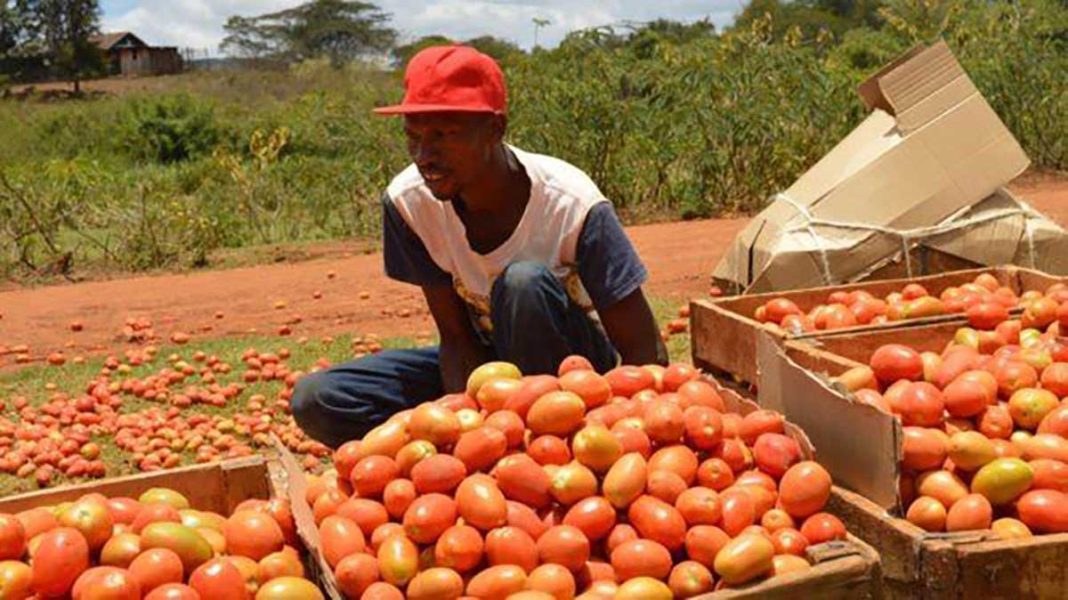Tomatoes – they could be Laikipia’s red gold . The soil is ideal and they’ve been cultivated in the region for decades. Yet , Laikipia tomatoes farms now stand empty and farmers are opting to leave tomatoes farming.
The reason is that tomatoes have become gambling chips in regional politics as have other products.
Kenya is a lucrative market. Shipments of imported tomatoes and fresh tomatoes products from neighboring countries like Uganda promise huge profits for middlemen and cartels.
County agricultural policies are destroying local markets and forcing people to leave their farms. These people are moving to urban centers in search of formal employment. They are forced to live under appalling conditions.
Agriculture Ministry – Laikipia
2018 ,the CEC comes in with empty promises. Promises to give life to the agriculture sector as soon as she assumes office. Farmers are assured that the government is seeking the support of the private sector to set up a tomato processing factory. The nearest yet farthest tomato processing factory is Kabaazi. Located hundreds of kilometers away.
The local farmers are keen to develop their economy and utilise the county’s own natural resources.
Today,all major projects that were launched by the Agriculture CEC have turned into white elephants including the program to support & protect tomato farmers.
For instance Mr. Kingori is a disturbed farmer. Despite his efforts to continue growing tomatoes despite the challenges, the future looks dim.For over 10 years ,he has faithfully grown tomatoes on his 10 acre piace of land in Wangwachi Village.
Farmers count losses
He is today among hundreds of tomato farmers who report losses as tons of crop rot on farms due to lack of demand.He borrowed Ksh 500,000 from a local bank earlier this year to invest in his tomato farm next to the Wangwachi dam, on whose waters he had been dependent for irrigation.
Soon came the rains and all his money went down the drain. He is today among hundreds of tomato farmers who report losses as tons of crop rot on farms due to lack of demand.
A tomato crate that had previously hunted Ksh. 6,000 is now selling for a few hundred shillings, if you’re lucky to find a willing buyer.
Now we feed our tomatoes to the cows and pigs. This is a total loss for us and even as we talk, the bank breathes down my neck and demands repayment of loans
Mr. Kingori,farmer
Tomato processing factory
It is not certain for now whether a private firm will come in and partner with the county on the concept of the tomato processing plant. What’s certain is, King’ori lost the Ksh. 500,000 that he had invested in his tomato farm.
There are many reasons; unstable farm extension services,corruption, unsuitable tomato varieties and regional trade policies.
The CEC introduced contract farming. Under this program farmers across the county thought they would benefit. Then came dam liners and water pans. Another huge scam.
Farmers here can’t bare the thought of giving up on farming.
Most are now turning farms into rental properties. Farming is no longer profitable under the current regime. Farming once provided a livelihood to an entire region. Frustration eats them up ,for those who are still interested in farming.
Power wrangles
Even if the farmers continue to persevere , the situation is not changing anytime soon. Power wrangles , are at the highest competition and those close to power stand a better chance of accessing the most lucrative services. It’s the people on the ground who loose out.
Nearly half of laikipia’s population lives from agriculture. A robust Agriculture industry would boost growth even in rural areas.
For many day laborers looking to be hired during the harvest season, attest to widespread unemployment. Even during the busiest harvesting season ,some fail to find work.
Crops grow in abundance in Laikipia. The farmers could grow even more land and hire more workers, but they are lacking funds. If they want to buy seeds and fertilizers, and pay for irrigation water , they’ll have to take loans.
We don’t have money for fertilisers. Everything is expensive. We can’t sell our harvest and end up in debts. I have a wife and children to care for, that’s why I have to abandon farming and try my luck in being a landlord. Rental houses are better. My farm is failing and the bank wants it’s money back”.
Kibor ,farmer
Broken ministry
Now that the Ministry of Agriculture has broken down, farmers have to sell their produce to market brokers (middlemen) who sell it in the towns. There is a surplus of demand during the harvest season. Therefore the farmers have to sell at a rock bottom price.
Milk farmers, maize farmers, etc., are faced with the same problems as tomato farmers. Lack of funds and clear policies from the county government agriculture ministry are not the only calamities jeopardizing markets and threatening the livelihoods of farmers.
They can’t compete with meat and milk products from other regions. Imports are driving out local products. That 70 -80 percent of products coming from elsewhere, translates to job losses. It translates to poverty and hopelessness. It translates to the mass Exodus of farmers to urban areas and into other sectors of the economy away from farming.
Most farmers are experimenting with alternative sources of livelihoods. In Laikipia farming turns out to be slowly more difficult than the Corona virus.

